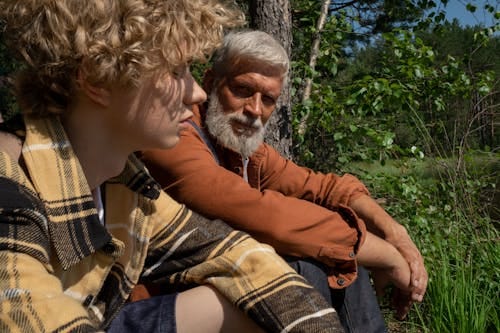In contemporary discourse, particularly with activists and those steeped in the self-care dogma, there's a burgeoning trend of labeling young people as inherently wise about both themselves and the world. This perspective, often intended to empower and validate, is instead part of the growing trend of well-meaningness that undermines personal growth, social relationships and societal functioning. As Thomas Sowell cogently explained:
Advice to the young: You don’t have to listen to anybody. You can learn everything from your own personal experience. Of course, you will be at least 50 years old by the time you know what you need to know at 25.
The point is, the "wisdom of youth" is a falsehood and not an innocuous one. Not only is it an oxymoron given most accepted definitions of wisdom, but prematurely labeling young individuals as wise can be detrimental to their ability to actually become so.
What is Wisdom
Wisdom, by its classical and most accepted definitions, is not merely the accumulation of knowledge but the application of experience, judgment, and compassion in making decisions. To be wise is to be able to consider life with a depth of understanding, empathy, and insight that transcends anything built on the simple accumulation of facts. It is rooted in the ability to connect what is learned with what is experienced in order to generate understanding that goes beyond surface connections, often manifesting in improvements for self and others.
Wisdom involves a balanced perspective on life’s challenges and opportunities. It means having the foresight to see the potential consequences of actions, the humility to admit when we don't have all the answers, and the openness to learn from every opportunity. A wise person understands that every experience, whether perceived as good or bad, offers valuable lessons. This person approaches situations with a blend of emotional intelligence, ethical consideration, and a sense of responsibility for their actions and their impacts on others in both the proximal and distal environment.
Wisdom is often connected to compassion and empathy. It requires an ability to step outside oneself and see the world from multiple perspectives. Wise individuals are adept at navigating complex social dynamics with grace, offering insights that bridge divides and foster understanding. They recognize the value of relationships, the strength in community, and the power of well-placed kindness and support.
Finally, wisdom is not static; it evolves and deepens with experience. It involves a continuous process of questioning, learning, and adapting. Wise people know that growth comes from facing challenges, embracing change, and remaining curious about the endless potential of life. They often also view life as a journey, where the goal is not to accumulate a static set of answers but to engage in a dynamic process of discovery and understanding.
In essence, to be wise is to combine knowledge with compassion, experience with humility, and insight with action. This understanding of wisdom highlights a critical flaw in the premature ascription of wisdom to youth: it overlooks the essential ingredient of lived experience.
The Pitfalls of Premature Praise
Thus, while it is possible that a young person could say something that is perceived as wise and may make observations that others interpret as such, it is unlikely for them to actually be wise. To avoid definitional quibbles, I will admit that my assessment is not necessarily the definitive perspective on wisdom and there is room for debate about what wisdom truly entails. However, the larger issue here is that believing in the wisdom of youth and promoting this idea among them can produce unwanted consequences that leave us all worse off. I have outlined a few below.
Stifling Interest in Growth and Learning
Telling young people they are wise suggests that they have already reached a pinnacle of understanding and maturity, which can stifle their drive and desire for growth and exploration. Without wisdom, one who is labeled as such loses the impetus to seek new experiences, challenge existing beliefs, and embrace the vulnerability of not knowing. Why would they be so motivated when they are positioned to believe they already know it all?
This can lead to a plateau in personal development, where the individual may miss out on essential learning opportunities because they are viewed as unnecessary. In essence, this perspective creates complacency. It fosters an environment where young people feel no urgency to push beyond their comfort zone or question their own perspective. This comfort from unearned confidence can lead to less curiosity and reduce interest in innovation, qualities that are crucial for personal and societal advancement.
Many have highlighted the lack of interest in learning from or about history currently, and the harm of this ignorance is compounded when we bestow the label of wise on someone without such knowledge and no history of their own. Where is wisdom to manifest when there is no learning and little experience to draw from?
Skewing Self-Perception and Impeding Emotional Resilience
The notion of the wisdom of youth also skews self-perception. When young people are told they are wise, the entitlement and narcissism typical of the immature only expands. Not only is there less interest in and openness to learning from others, but any critical feedback will be viewed not as a potential opportunity to reflect and improve but as an affront to their inflated sense of self.
This impairs not only personal growth but also emotional resilience, which is built from adversity and the need to navigate a range of emotions. When young people are labeled as wise, it validates their emotional reactions and leaves them more vulnerable because they will be ill-equipped to interrogate their experience and take ownership for their response. Upset will always be viewed as externally caused and the responsibility for change outsourced to those who are seen to have created it.
Wisdom involves recognizing one's vulnerabilities and learning to cope with life's inevitable ups and downs. Part of this is learning to identify when your personal bias or interpretation might be contributing to your suffering - and that of others. Shielding young people from this process can deprive them of the chance to build the emotional resilience necessary for navigating adult life and impair their ability to foster connection with others, who are seen as the source rather than a solution to personal hardship.
Discouraging Connection and Advice-Seeking
Further, as the Sowell quote suggests, one who feels that their experience trumps all is not open to learning from others. When labeled as wise prematurely, individual perspective and experience take precedence, cultivating a me-first way of interacting with the world not conducive to making deep connections. It can also reduce an interest in learning from the wisdom of others, not least of which comes from talking to those who have gone before.
A wise individual is often one who is sought out for advice. While those who are truly wise know that asking for perspective from others is important for growth and understanding, an immature individual who believes they are wise likely does not. This premature labeling will reduce interest in the viewpoints of others, particularly when they are counter to one’s current view. If wisdom comes from experience, but one without it is labeled as wise, they are unlikely to see the value in the experiences of others. The explosion of shout-downs on college campuses, can in part, be seen is a consequence of this falsehood. A wise person is open to listening, even when they don’t like what someone else has to say.
Finally, if the wise are looked to for advice, this suggests that we should listen to young people and use their opinions and expressed desires to guide policy decisions and give them autonomy in all domains. We have seen just how damaging this can be in the growing scandal and exposure of harm in medicalized gender transitions as just one example. The reality is, young people often don’t know what’s best for them and adults who capitulate their role in guiding them toward this knowledge are failing to protect them, ultimately doing us all a disservice.
See more: The Harm in Student-Centered Education
Instead, Let’s Teach Them to Embrace the Journey
Because the journey towards wisdom is lifelong and marked by continuous learning, self-reflection, and an openness to change, we undermine its development when we advocate for the wisdom of youth. Rather than prematurely anointing them with this mantel, it is more beneficial to encourage them to embrace the journey of becoming. This involves fostering a culture that values curiosity, resilience, humility, and the understanding that wisdom is not a destination but a path—one that unfolds only over time and through challenges. It also involves critical feedback and reminders of one’s immaturity, fostering both the intellectual and personal humbleness that will create an openness to the range of opportunities that promote flourishing.
In sum, while it's important to recognize and celebrate the potential of young people, labeling them as wise overlooks the essence of what it means to be wise. Let us empower them to become wise and support them in their own journeys of growth, exploration, and self-discovery built on challenge, risk, failure, and exposure to their shortcomings. After all, the true wisdom of humanity lies not reaching some endpoint but in all that we can create when we are filled with the courage to seek, learn, and continuously evolve.








Why teach young people about resilience? They can learn all the wisdom they need from therapy-speak Tik-Toks! No need for anything else. See?